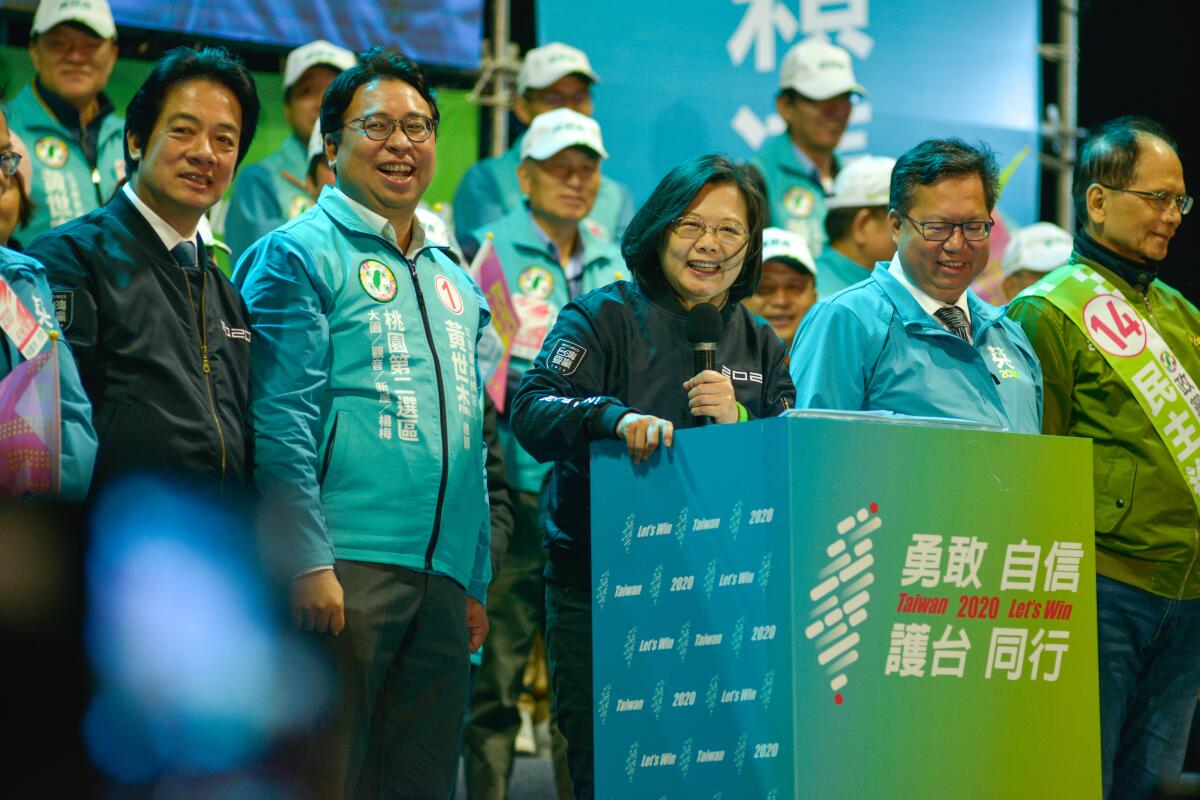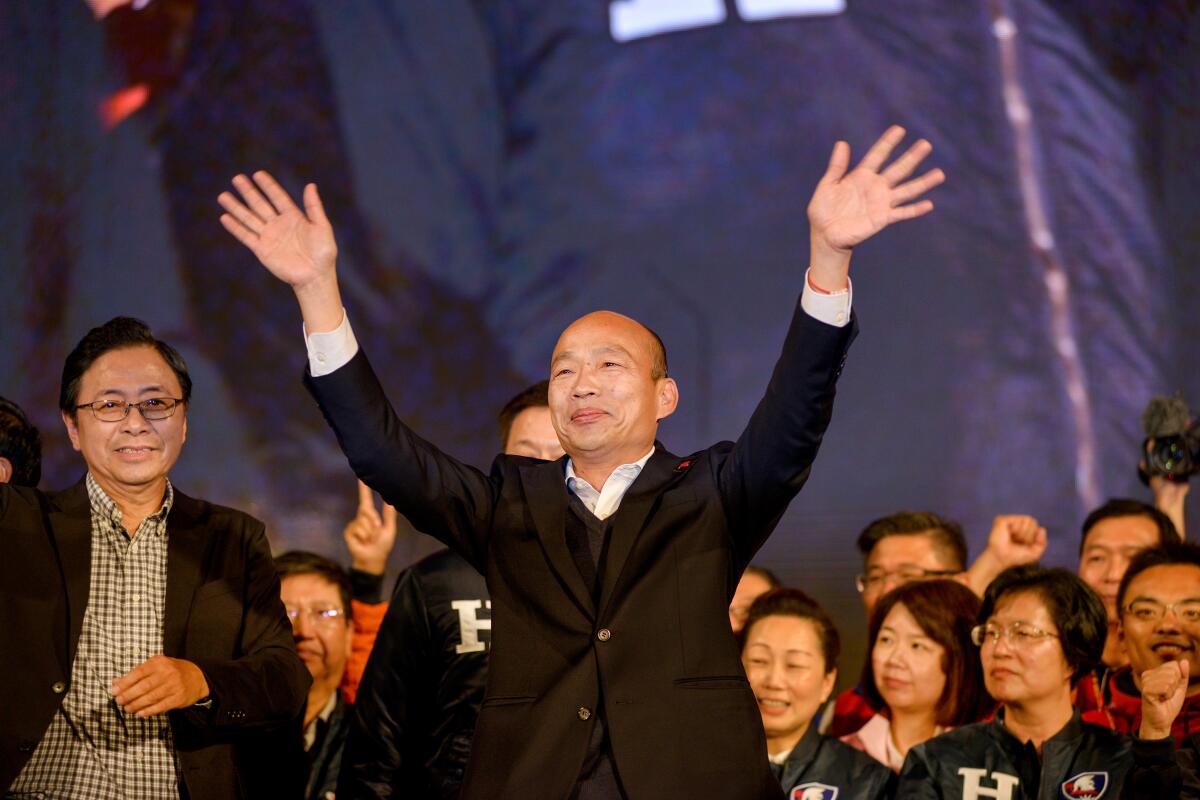Taiwanese will elect a president Saturday, in a vote guided by anxiety about China

- Share via
TAIPEI, Taiwan — Taiwanese voters go to the polls Saturday to pick a president and legislature in an election shaped by ever-shifting threats from political and military rival China.
About 18 million people are eligible to vote in a democracy that emerged from authoritarian rule more than two decades ago. Incumbent Tsai Ing-wen of the Democratic Progressive Party has a large lead in the polls against Han Kuo-yu of the Kuomintang and James Soong of the People First Party.
What are voters most concerned about?
Taiwan’s sticky relationship with China, the biggest economy in Asia and the Eastern Hemisphere’s only major power, is the top issue, as is typical in Taiwanese presidential elections. China claims sovereignty over the island just off its southeastern coast, insisting that the two sides eventually unite despite Taiwan’s 70-plus years of self-rule.
In 1949, Chiang Kai-shek’s Kuomintang, also known as the Nationalists or KMT, lost a civil war to the Communists and fled to Taiwan. The two sides do not have formal diplomatic relations, and China has never renounced the threat of force if needed to reunify. Taiwan, whose official name is the Republic of China, maintains the world’s 22nd largest military, despite its relatively small population of 23 million.
After decades of martial law, Taiwan held its first presidential election in 1996 and is now a healthy democracy, with a lively press and a highly engaged electorate. Los Angeles-area residents with Taiwanese roots are watching the election closely, and some with dual citizenship have traveled to Taiwan to campaign and vote.
Chinese President Xi Jinping’s speech last January, advocating that Taiwan submit to the same “one country, two systems” structure as Hong Kong, has alarmed many Taiwanese. Taiwan government opinion surveys last year showed that 4 in 5 Taiwanese oppose unification with China.
Some voters say the ongoing pro-democracy street protests in Hong Kong have not heightened their concerns of similar unrest in Taiwan, because Taiwan already holds de facto independence, with its own constitution and armed forces.
“Taiwan’s future and China, what’s the cooperation style, that’s the important issue in this election,” said Tung Yu-hsin, 23, a social service industry worker in Taipei, the capital. “We advocate freedom, so that’s different from China, and that’s the aspect I’m most concerned about. Taiwan and China are different countries.”

Tied to cross-strait relations is Taiwan’s economic development, with the KMT arguing that a better relationship with China is necessary for growth and the Democratic Progressive Party, or DPP, looking to develop markets in Southeast Asia and beyond.
Who’s who on the ballot, and what do they plan to do about China?
With few other pressing issues on the economically well-off island, candidates spent much of the last six months campaigning on their China platforms.
Tsai, 63, a U.S.- and London-educated former law professor, is seeking a second term after becoming Taiwan’s first female president in 2016. She has criticized Xi’s January speech and voiced support for the Hong Kong protesters. Her words are meant to remind voters they need a strong president to keep China at bay, political analysts in Taiwan believe. She and the DPP advocate stronger autonomy for Taiwan, short of declaring outright independence.
In her first term, Tsai rejected Beijing’s offer for dialogue based on the 1992 Consensus, which holds that there is only one China but each side can maintain its own definition of what that means. Beijing has retaliated by sending military planes and aircraft carriers near the island, restricting Chinese tourism in Taiwan and picking off seven of Taiwan’s few remaining diplomatic allies.
Since President Nixon visited China in 1972, most countries have chosen to recognize China, not Taiwan, and Taiwan is shut out of major international organizations like the United Nations.
Han, 62, the populist mayor of Taiwan’s chief port city of Kaohsiung, advocates accepting China’s conditions for dialogue in hopes of strengthening Taiwan’s export-reliant economy. His approach would be a return to that of former President Ma Ying-jeou, who inked more than 20 trade and investment deals with China, enabling direct air links and Chinese tourism, during his eight years in office. Some Taiwanese feared that Ma was bringing them dangerously close to China and staged massive protests in 2014.
The Taiwan government’s official 2019 GDP growth forecast rose to 2.64% over the year, which helped push economic issues lower on the 2020 campaign agenda.
The KMT is hoping that Han can stage a Trump-like turnaround to prove the polls wrong. Soong, a perennial candidate, is a distant third and could siphon voters from Han.
Taiwan will also elect a new 113-seat legislature. Under DPP control, the legislature passed a bill on Dec. 31 that outlaws “infiltration” by China through campaign contributions and other election influence. The bill has been criticized by KMT supporters as restricting freedom of speech.
Is China trying to influence the election?
Chinese influence on the election has been a concern. Scholars say that Taiwan has been the target of a Russian-style social media disinformation campaign by China, designed to exploit social divisions and undermine democracy. A study by the V-Dem Institute at the University of Gothenburg in Sweden found that Taiwan was the territory most exposed to foreign disinformation, based on weighted ratings by experts. The U.S. ranked No. 13.
On a single day in December, Facebook shut down 118 Taiwanese fan pages, 99 groups and 51 accounts, including at least one unofficial fan group with more than 150,000 members for Han Kuo-yu.
How do elections work in Taiwan?
Elections take place on Saturdays, a day off for most people. In 2016, turnout reached a 20-year high of almost 80%. Voters line up at the sprawling campuses of Taiwan’s public schools, where ballot boxes displace students’ desks from 8 a.m. through 4 p.m.
Election tampering or other major voting gaffes are rare in Taiwan. Ballot counting starts as soon as polls close, and results normally emerge within hours.
More to Read
Sign up for Essential California
The most important California stories and recommendations in your inbox every morning.
You may occasionally receive promotional content from the Los Angeles Times.











